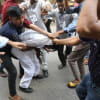Column by Mahfuz Anam: Our political culture – you reap what you sow

The ruling Awami League is reaping what it has sown and paying the price for what it has allowed to grow in the name of party loyalty over almost 15 continuous years in power – arrogance, disrespect for the law, disdain for dissent, and demonisation of the opposition.
It all begins with the mindset of arrogance that is cultivated within the party – that anybody who opposes the party cannot have the country's best interest in their heart and hence must be an "enemy" of Bangladesh, or that such a person is at best someone whose patriotism needs to be questioned. There is nothing good and everything bad among those who critique the Awami League. In fact, there is an implicit assumption that no one but the AL – the party that led the country during the Liberation War – has the right to rule this country. The role of the people and that of the Mukti Bahini, and of other political parties (however small), are never fully evaluated and as such recognised or honoured. This was starkly evidenced in the way the 50 years of our independence was celebrated. It is all and always about the AL, which is hardly a recipe for the development of democratic values and a tolerant culture.
Let's take for an example the case of the attack on Ashraful Hossain Alom, better known as Hero Alom. It is quite possible that no party directive (or even a lower level message) to attack him was conveyed. But the local cadres thought it their duty to "teach a lesson" to someone who dared to challenge the party, even if it is his fundamental right. So ingrained is the party's political culture of intolerance that every cadre of any level can decide on his own to assault a political opponent, in the full confidence that not only will they not be reprimanded, but they may even be praised or rewarded for their "courageous act."
In December 2012, we had an early instance of BCL's gruesome activity in the hacking to death of 24-year-old Bishwajit Das in broad daylight in Old Dhaka's Shankhari Bazar. The court later sentenced eight people to death and 13 others to life imprisonment. Then there was the case of Bangladesh University of Engineering and Technology (Buet) student Abrar Fahad, who was tortured on October 7, 2019 by the university's wing of Bangladesh Chhatra League (the ruling party's student front) so mercilessly and over such a long period of time that he died as a result. It was discovered that the faction had turned one of the rooms – 2011 – of the Sher-e-Bangla Hall into a "torture cell" where students who did not show sufficient obedience and loyalty to the BCL and its high-ups were punished. Twelve members of the BCL and eight of their followers were later sentenced to death in 2021. We know that only the highly meritorious get admission into Buet. So what sort of a political culture could have turned these 20 top-notch students into such monsters?
Earlier, in 2018, we saw the emergence of the "helmet bahini" (gang) consisting of BCL cadres, during the Road Safety Movement of school students. This group recklessly and relentlessly attacked school-going students just for demanding safe roads – something that every citizen wanted. We saw them again during the agitation concerning quota for government jobs, dishing out the same sort of violence.
After 32 years, we should have cultivated some values of democracy and tolerance, and incorporated those into our political culture. No occasion is missed in reprimanding the media for "spoiling" the image of the country. But does the image of the country not get spoiled when our two biggest political parties – both of which have enjoyed power – shout instead of talk, accuse instead of understand, and constantly introduce pre-conditions before starting any negotiations, proving over and over again that they don't have the maturity to make desperately needed compromises, the absence of which threatens social peace, economic stability, and democratic evolution?
Despite public condemnation, such gangsterism was patronised and used to subvert the emergence of any movement by the opposition or spontaneous ones by ordinary students, the youth, or by citizens. Whenever the students protested – for example, against VAT being imposed on private universities or the like – the BCL and the aforementioned bahini were used to suppress them. When the BNP was in power in 1991-1996 and 2001-2006, no BCL-affiliated student could live in the Dhaka University dormitories. So, when AL returned to power in 2008, the situation was reversed and has remained that way for the last 14 or more years, leading to all sorts of abuse and corruption and resulting in ruling party activists wielding total control over the dorms (including deciding who would and wouldn't be allowed get a seat there).
Since the fall of Ershad in 1991, only two parties – AL and BNP – have enjoyed power and ruled us. The biggest harm that these two parties have done to our politics is their aversion to opposing and divergent views, and their hostility towards individuals or groups who challenged them. When the BNP ruled, it was intellectuals, writers, academics, and journalists of their political hue who got recognised, honoured, promoted, funded, and placed in crucial positions. When AL came to power, the same things happened but for a longer time. The list of honourees for the Ekushey Padak (Language Movement Medal) and Swadhinata Padak (Independence Day Medal) more than prove our assertion. This has severely compromised the independence and stature of our intellectuals and, to our great detriment, politicised them.
Once again, we are about to hold an election, and once again, all the flaws in our political culture are out in the open. We all want a free and fair election, but don't know how to realise it. The opposition's demand of a caretaker government which, in other words, is asking Sheikh Hasina to give up power, will not happen. That's where we have been stuck and that's where we are likely to remain. As we have no precedent for a negotiated agreement of relinquishing of power – except by Gen Ershad in December 1990 – we have no chance of this being settled across the table. So it will be decided by a show of street power, with all its disruptive and destructive features. Here, too, if an understanding could be reached, it would allow both sides (especially the opposition), on conditions of peaceful demonstration and non-violence, to hold their rallies, demonstrations, and meetings as they wished.
Sadly, even this understanding also seems unlikely. The fact that the ruling party announces their rallies on the same dates as the BNP's clearly indicates that, on every occasion, the AL wants to match the BNP's show of strength. This is quite absurd and is most likely to lead to violence and, possibly, deaths. Already, one person has died and scores have been injured. This could easily have been avoided if the AL had held its programmes on a different date.
After 32 years, we should have cultivated some values of democracy and tolerance, and incorporated those into our political culture. No occasion is missed in reprimanding the media for "spoiling" the image of the country. But does the image of the country not get spoiled when our two biggest political parties – both of which have enjoyed power – shout instead of talk, accuse instead of understand, and constantly introduce pre-conditions before starting any negotiations, proving over and over again that they don't have the maturity to make desperately needed compromises, the absence of which threatens social peace, economic stability, and democratic evolution?
Our people, but for whose hard work, sacrifice, and love for the country we would not have come where we have, deserve better.
Mahfuz Anam is the editor and publisher of The Daily Star.

 For all latest news, follow The Daily Star's Google News channel.
For all latest news, follow The Daily Star's Google News channel. 












Comments